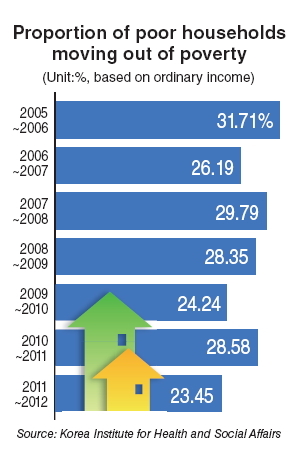
The number of South Koreans pulling themselves out of poverty or moving into the upper income brackets has dwindled in recent years, a report showed on Tuesday.
According to the Korea Institute of Health and Social Affairs, the rate of people moving out of poverty has decreased more than 8 percentage points from 32 percent in 2005-06 to 23 percent in 2011-12. This means that one out of every three low-income households was able to move up to the upper-income brackets in 2005-06. But in 2011-12, only one out of four poor households escaped from poverty, the research agency under the Ministry of Health and Welfare said.
It also became difficult for members of the middle class to move up on the socio-economic ladder, the report showed. The proportion of people in the middle-income bracket moving into the upper-income group also dropped from 13.38 percent in 2005-06 to 10.95 percent in 2011-12.
The number of poor households jumping into the high-income bracket also dived from 2.53 percent in 2005-06 to 0.48 percent in 2011-12, indicating that very few Koreans are suddenly becoming rich.
“The chances of poor households staying in their position are growing but the rate of people escaping from poverty and moving into mid- and high-income brackets is slowing,” the KIHASA said in the report.
“(The government) must support the low-income bracket to move up to upper-income groups by creating quality jobs and (implementing) welfare policies,” it added.
The report studied a total of 9,407 households and their ordinary income between 2005 and 2012. It established the poverty line as 50 percent of the median equivalized household income.
In a similar context, the rate at which debt-ridden households became debt free within one year dropped from 66 percent in 2005-06 to 54.5 percent in 2011-12.
The report also showed that the chances of temporary workers gaining regular job status dropped from 15 percent in 2010-11 to 9.97 percent in 2011-12. The rate of irregular workers keeping their job status climbed up 86.7 percent in 2011-12 from 83.7 percent in 2009-10.
About 35 percent of the respondents who participated in the study said they have experienced poverty for more than a year.
By Cho Chung-un (
christory@heraldcorp.com)





![[Exclusive] Hyundai Mobis eyes closer ties with BYD](http://res.heraldm.com/phpwas/restmb_idxmake.php?idx=644&simg=/content/image/2024/11/25/20241125050044_0.jpg)
![[Herald Review] 'Gangnam B-Side' combines social realism with masterful suspense, performance](http://res.heraldm.com/phpwas/restmb_idxmake.php?idx=644&simg=/content/image/2024/11/25/20241125050072_0.jpg)

